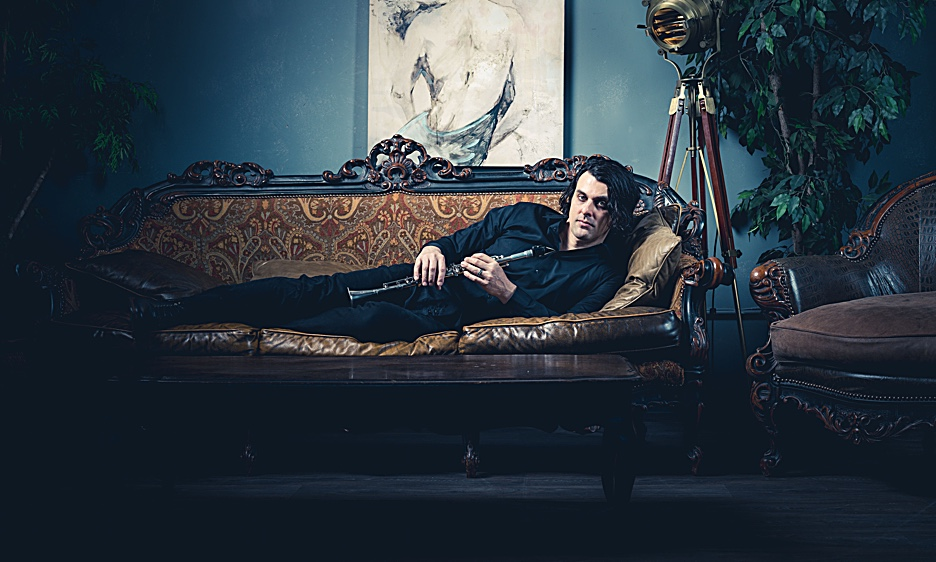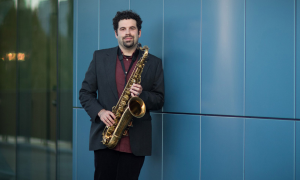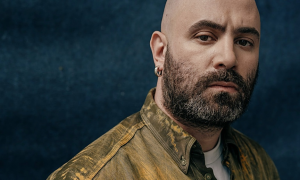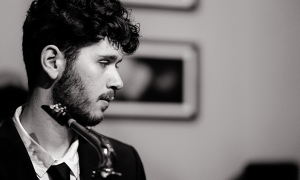Home » Jazz Articles » Take Five With... » Take Five with Multi-Instrumentalist Jason Vitelli
Take Five with Multi-Instrumentalist Jason Vitelli

Meet Jason Vitelli
We now find Brooklyn-based musician Jason Vitelli standing at a crossroads, pivoting from being a prolific songwriter into an eclectic composer. Though he has previously written for video, his upcoming 4th album, 1. Ambient Corridors (2024), stands out as an inaugural collection of captivating works. He curates an opus of twelve pieces, weaving together acoustic instrumentation, such as cello, piano, and clarinet, with synthetic elements that include electronic programming and sampling. Each track, from the expansive orchestral vistas of "Chukchi Sea," the intense sound design of "Irrational Quash," to the contrapuntal exposition within "Lost and Found," carries a unique essence. His diverse musical background includes performing in jazz combos at such notable NYC venues as Minton's Playhouse and The Flatiron Room, as well as in rock bands at various establishments in the Catskills.Instruments:
Piano, alto sax, soprano clarinet, guitar and bass guitar.Teachers and/or influences?
No teacher sticks in my mind, but mentors do. About 20 years ago, I apprenticed under the film composer Gary Pozner. More than anything, my work with him set me upon the path of which I am now. My influences are across the board; it really is whatever I am listening to at the moment, but if I had to name one person, I would say David Bowie.I knew I wanted to be a musician when...
As long as I can remember. In my earliest memory, I attended a solo banjo player performance at the public library. I was only three years old and for the whole show, I was transfixed. I still remember the feeling I had; a mixture of awe and exhilaration. To this day, that wonderment reemerges whenever I am in the midst of great music.Your sound and approach to music.
I primarily studied to be a composer and only secondarily studied as a musician. Therefore, my education emphasized learning as many instruments as possible for honing my writing and orchestration skills. I developed some jazz chops over the years from self-study, gigging around the city and participating in jam sessions. As both a player and composer, I do not envision myself beholden to any genre. I'll always see myself as a student of musical idioms.Your dream band
The ideal band constantly is evolving my head, depending on the current project. However, the first folks that come to mind are my wife Lisa Trenary on vocals, Cherette White on vocals, Yorgos Maniatis on drums and Dave Ramsay on piano and guitar. These are the most sympathetic players with which I have ever worked. Not surprisingly, they are also awesome people!Favorite venue
I am always partial to playing outside in beautiful weather. That being said, I've had some of my favorite musical moments at the Rock Hill Summer Concert Series in Sullivan County, NY. The show is set upon an open field where they also host a weekly farmers market. My rock band, The Big Sticky Band, has built relationships with some wonderful people there during the busy season.Your favorite recording in your discography and why?
I wouldn't choose a song, but instead an album—Confluence. It was a project I recorded with the boutique audiophile label, Soundkeeper Recordings. The producer/engineer Barry Diament has devised a wonderful method to record performances direct-to-stereo. His motto for the label is "You are Here!" which is a testament to the accuracy of which he captures in a room. In my experience, the challenge was formidable to find the right players, rehearse them (and myself) sufficiently, and bring them on location to perform for the mics. The result was breathtaking. Barry has also recorded a straight ahead jazz album with renowned bassist Paul Beaudry that I wholly recommend.What do you think is the most important thing you are contributing musically?
Empathy, for both my fellow musicians and my audience.Did you know...
I grew up only a couple of miles away from John Coltrane's final home on Long Island. When I found out about it, I was floored. For a place that felt so humdrum, here was this icon that made my neighborhood his home.The first jazz album I bought was:
Speaking of Coltrane, the first jazz album I ever bought was Giant Steps. What a giant step it was for my ears to have taken! No doubt, that album gave me the impetus to start learning jazz theory and alto sax.Music you are listening to now
U2: October (Island Records)Radiohead: A Moon Shaped Pool (XL Recordings)
Chris Potter: Underground (Sunnyside Records)
The Beatles: Help ! (Parlophone)
Cosmic American Derelicts: The Twain Shall Meet (Soundkeeper Recordings)
Desert Island picks
John Coltrane: A Love Supreme (Impulse! Records)Jeff Buckley: Grace (Columbia Records)
Bill Evans: Portrait in Jazz (Riverside Records)
Johannes Brahms/Claudio Abbado/Berlin Philharmonic: Symphony #3, Tragic Overture, Schicksalslied (Deutsche Grammophon)
David Bowie: Low (RCA Records)
How would you describe the state of jazz today?
It's hard for me to say, since I haven't been on the scene as of late. Nonetheless, I've experienced the genre more as period music than a vibrant living thing. Its history is so beautifully rich yet, many players I've known feel intense pressure to master every note that came before today and they strive for something beyond the present. Don't get me wrong, I do believe the past masters, techniques and theories need to be studied in depth, however, why can't we focus on performing just for today? Back when it was evolving, it was avant-garde, it was sexy, it was rebellious, it was the rock and roll of its time.What are some of the essential requirements to keep jazz alive and growing?
Miles Davis eloquently stated, "You can't copy the past. You can hear it, but you can't copy it." He also said, "Do not fear mistakes, there are none." If we follow those two axioms, the jazz idiom will continue to evolve.What is in the near future?
I plan to release the full 1. Ambient Corridors album in 2024. Referencing the number one, this album is the first of a series of instrumental albums I plan to put out.What is your greatest fear when you perform?
Not being in the moment. Also, losing a key pad from my sax in the middle of a solo!What song would you like played at your funeral?
Something fun, like "Iko Iko" or another Second Line anthem! I'd like my funeral to be more of a party, because life should be spent in celebration as much as possible.What is your favorite song to whistle or sing in the shower?
The first thing I thought of was "Singin' in the Rain." I guess I'm a Clockwork Orange fan!By Day:
I work as an Office Manager at a private credit firm in Manhattan.If I weren't a jazz musician, I would be a:
I probably would have ended up a psychologist. Not saying I would be happy doing it though. That was what I was majoring in college before I studied music full-time.If I could have dinner with anyone from history, who would it be and why?
Gene Wilder, because I always loved his humor growing up. He seems like the kind of guy I'd want to share a drink with and perhaps pick his brain (figuratively speaking).If I could go back in time and relive an experience, what would it be?
I would relive the experience of watching the banjo player when I was three, which I had mentioned in a previous question. It's as if I discovered who I am right at that moment.To quote James Lipton: If heaven exists, what would you like to hear God say when you arrive at the pearly gates?
"Do you think you belong here?" I think that question sets up a pretty interesting conversation!Tags
Take Five With...
Jason Vitelli
AAJ Staff
Minton's Playhouse
The Flatiron Room
David Bowie
Paul Beaudry
John Coltrane
Chris Potter
Bill Evans
Miles Davis
PREVIOUS / NEXT
Support All About Jazz
 All About Jazz has been a pillar of jazz since 1995, championing it as an art form and, more importantly, supporting the musicians who make it. Our enduring commitment has made "AAJ" one of the most culturally important websites of its kind, read by hundreds of thousands of fans, musicians and industry figures every month.
All About Jazz has been a pillar of jazz since 1995, championing it as an art form and, more importantly, supporting the musicians who make it. Our enduring commitment has made "AAJ" one of the most culturally important websites of its kind, read by hundreds of thousands of fans, musicians and industry figures every month.
























